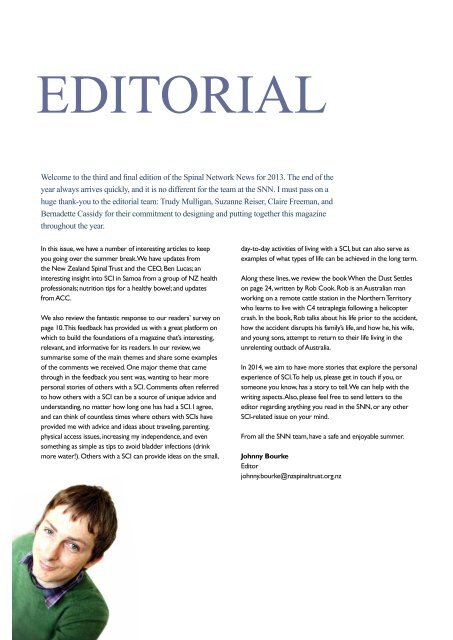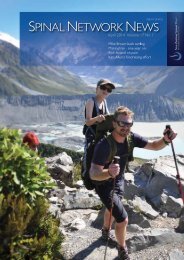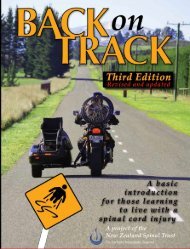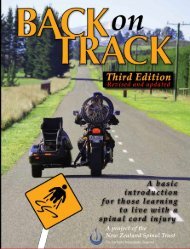SPINAL NETWORK NEWS
You also want an ePaper? Increase the reach of your titles
YUMPU automatically turns print PDFs into web optimized ePapers that Google loves.
EDITORIAL<br />
Welcome to the third and final edition of the Spinal Network News for 2013. The end of the<br />
year always arrives quickly, and it is no different for the team at the SNN. I must pass on a<br />
huge thank-you to the editorial team: Trudy Mulligan, Suzanne Reiser, Claire Freeman, and<br />
Bernadette Cassidy for their commitment to designing and putting together this magazine<br />
throughout the year.<br />
In this issue, we have a number of interesting articles to keep<br />
you going over the summer break. We have updates from<br />
the New Zealand Spinal Trust and the CEO, Ben Lucas; an<br />
interesting insight into SCI in Samoa from a group of NZ health<br />
professionals; nutrition tips for a healthy bowel; and updates<br />
from ACC.<br />
We also review the fantastic response to our readers’ survey on<br />
page 10. This feedback has provided us with a great platform on<br />
which to build the foundations of a magazine that’s interesting,<br />
relevant, and informative for its readers. In our review, we<br />
summarise some of the main themes and share some examples<br />
of the comments we received. One major theme that came<br />
through in the feedback you sent was, wanting to hear more<br />
personal stories of others with a SCI. Comments often referred<br />
to how others with a SCI can be a source of unique advice and<br />
understanding, no matter how long one has had a SCI. I agree,<br />
and can think of countless times where others with SCIs have<br />
provided me with advice and ideas about traveling, parenting,<br />
physical access issues, increasing my independence, and even<br />
something as simple as tips to avoid bladder infections (drink<br />
more water!). Others with a SCI can provide ideas on the small,<br />
day-to-day activities of living with a SCI, but can also serve as<br />
examples of what types of life can be achieved in the long term.<br />
Along these lines, we review the book When the Dust Settles<br />
on page 24, written by Rob Cook. Rob is an Australian man<br />
working on a remote cattle station in the Northern Territory<br />
who learns to live with C4 tetraplegia following a helicopter<br />
crash. In the book, Rob talks about his life prior to the accident,<br />
how the accident disrupts his family’s life, and how he, his wife,<br />
and young sons, attempt to return to their life living in the<br />
unrelenting outback of Australia.<br />
In 2014, we aim to have more stories that explore the personal<br />
experience of SCI. To help us, please get in touch if you, or<br />
someone you know, has a story to tell. We can help with the<br />
writing aspects. Also, please feel free to send letters to the<br />
editor regarding anything you read in the SNN, or any other<br />
SCI-related issue on your mind.<br />
From all the SNN team, have a safe and enjoyable summer.<br />
Johnny Bourke<br />
Editor<br />
johnny.bourke@nzspinaltrust.org.nz<br />
2
















